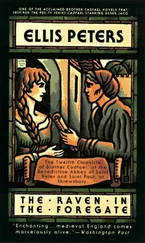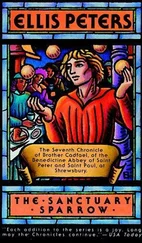Ellis Peters - One Corpse Too Many
Здесь есть возможность читать онлайн «Ellis Peters - One Corpse Too Many» весь текст электронной книги совершенно бесплатно (целиком полную версию без сокращений). В некоторых случаях можно слушать аудио, скачать через торрент в формате fb2 и присутствует краткое содержание. Жанр: Исторический детектив, на английском языке. Описание произведения, (предисловие) а так же отзывы посетителей доступны на портале библиотеки ЛибКат.
- Название:One Corpse Too Many
- Автор:
- Жанр:
- Год:неизвестен
- ISBN:нет данных
- Рейтинг книги:3 / 5. Голосов: 1
-
Избранное:Добавить в избранное
- Отзывы:
-
Ваша оценка:
- 60
- 1
- 2
- 3
- 4
- 5
One Corpse Too Many: краткое содержание, описание и аннотация
Предлагаем к чтению аннотацию, описание, краткое содержание или предисловие (зависит от того, что написал сам автор книги «One Corpse Too Many»). Если вы не нашли необходимую информацию о книге — напишите в комментариях, мы постараемся отыскать её.
One Corpse Too Many — читать онлайн бесплатно полную книгу (весь текст) целиком
Ниже представлен текст книги, разбитый по страницам. Система сохранения места последней прочитанной страницы, позволяет с удобством читать онлайн бесплатно книгу «One Corpse Too Many», без необходимости каждый раз заново искать на чём Вы остановились. Поставьте закладку, и сможете в любой момент перейти на страницу, на которой закончили чтение.
Интервал:
Закладка:
Godith controlled both her face and her pace, and gave no sign of recognition. In the church she strolled away to join her fellow-pupils, and even exchanged a few nudges and grins with them. If he was still watching, let him wonder, doubt, change his mind. He had not seen her for more than five years. Whatever his speculations, he could not be sure. Nor was he watching this part of the church, she noted; his eyes were on the unknown lady in mourning most of the time. Godith began to breathe more easily, and even allowed herself to examine her affianced bridegroom almost as attentively as he was observing Aline Siward. When last seen, he had been a coltish boy of eighteen, all elbows and knees, not yet in full command of his body. Now he had a cat’s assured and contemptuous grace, and a cool, aloof way with him. A presentable enough fellow, she owned critically, but no longer of interest to her, or possessed of any rights in her. Circumstances alter fortunes. She was relieved to see that he did not look in her direction again.
All the same, she told Brother Cadfael about it, as soon as they were alone together in the garden after supper, and her evening lesson with the boys was over. Cadfael took it gravely.
“So that’s the fellow you were to marry! He came here straight from the king’s camp, and has certainly joined the king’s party, though according to Brother Dennis, who collects all the gossip that’s going among his guests, he’s on sufferance as yet, and has to prove himself before he’ll get a command.” He scrubbed thoughtfully at his blunt, brown nose, and pondered. “Did it seem to you that he recognised you? Or even looked over-hard at you, as if you reminded him of someone known?”
“I thought at first he did give me a hard glance, as though he might be wondering. But then he never looked my way again, or showed any interest. No, I think I was mistaken. He doesn’t know me. I’ve changed in five years, and in this guise … In another year,” said Godith, astonished and almost alarmed at the thought, “we should have been married.”
“I don’t like it!” said Cadfael, brooding. “We shall have to keep you well out of his sight. If he wins his way in with the king, maybe he’ll leave here with him in a week or so. Until then, keep far from the guest house or the stables, or the gate house, or anywhere he may be. Never let him set eyes on you if you can avoid.”
“I know!” said Godith, shaken and grave. “If he does find me he may turn me to account for his own advancement. I do know! Even if my father had reached shipboard, he would come back and surrender himself, if I were threatened. And then he would die, as all those poor souls over there have died… .” She could not bear to turn her head to look towards the towers of the castle, hideously ornamented. They were dying there still, though she did not know it; the work went on well into the hours of darkness. “I will avoid him, like the plague,” she said fervently, “and pray that he’ll leave soon.”
Abbot Heribert was an old, tired and peace-loving man, and disillusionment with the ugly tendencies of the time, combined with the vigour and ambition of his prior, Robert, had disposed him to withdraw from the world ever deeper into his own private consolations of the spirit. Moreover, he knew he was in disfavour with the king, like all those who had been slow to rally to him with vociferous support. But confronted with an unmistakable duty, however monstrous, the abbot could still muster courage enough to rise to the occasion. There were ninety-four dead or dying men being disposed of like animals, and every one had a soul, and a right to proper burial, whatever his crimes and errors. The Benedictines of the abbey were the natural protectors of those rights, and Heribert did not intend King Stephen’s felons to be shovelled haphazard and nameless into an unmarked grave. All the same, he shrank from the horror of the task, and looked about him for someone more accomplished in these hard matters of warfare and bloodshed than himself, to lend support. And the obvious person was Brother Cadfael, who had crossed the world in the first Crusade, and afterwards spent ten years as a sea captain about the coasts of the Holy Land, where fighting hardly ever ceased.
After Compline, Abbot Heribert sent for Cadfael to his private parlour.
“Brother, I am going — now, this night — to ask King Stephen for his leave and authority to give Christian burial to all those slaughtered prisoners. If he consents, tomorrow we must take up their poor bodies, and prepare them decently for the grave. There will be some who can be claimed by their own families, the rest we shall bury honourably with the rites due to them. Brother, you have yourself been a soldier. Will you — if I speed with the king — will you take charge of this work?”
“Not gladly, but with all my heart, for all that,” said Brother Cadfael, “yes, Father, I will.”
Chapter Three
Yes, I will,” said Godith, “if that’s how I can best be useful to you. Yes, I will go to my morning lesson and my evening lesson, eat my dinner without a word or a look to anyone, and then make myself scarce and shut myself up here among the potions. Yes, and drop the bar on the door, if need be, and wait until I hear your voice before I open again. Of course I’ll do as you bid. But for all that, I wish I could go with you. These are my father’s people and my people, I wish I could have some small part in doing them these last services.”
“Even if it were safe for you to venture there,” said Cadfael firmly, “and it is not, I would not let you go. The ugliness that man can do to man might cast a shadow between you and the certainty of the justice and mercy God can do to him hereafter. It takes half a lifetime to reach the spot where eternity is always visible, and the crude injustice of the hour shrivels out of sight. You’ll come to it when the time’s right. No, you stay here and keep well out of Hugh Beringar’s way.”
He had even thought of recruiting that young man into his working-party of able-bodied and devoutly inclined helpers, to make sure that he spent the day away from anywhere Godith might be. Whether in a bid to acquire merit for their own souls, out of secret partisan sympathy with the dead men’s cause, or to search anxiously for friends or kin, three of the travellers in the guest house had volunteered their aid, and it might have been possible, with such an example, to inveigle others, even Beringar, into feeling obliged to follow suit. But it seemed that the young man was already out and away on horseback, perhaps dancing hopeful attendance on the king; a newcomer seeking office can’t afford to let his face be forgotten. He had also ridden out the previous evening as soon as Vespers was over, so said the lay brothers in the stables. His three men-at-arms were here, idling their day away with nothing to do once the horses were groomed, fed and exercised, but they saw no reason why they should involve themselves in an activity certainly unpleasant, and possibly displeasing to the king. Cadfael could not blame them. He had a muster of twenty, brothers, lay brothers and the three benevolent travellers, when they set out across the bridge and through the streets of the town to the castle.
Probably King Stephen had been glad enough to have a service offered voluntarily which he might otherwise have had to impose by order. Someone had to bury the dead, or the new garrison would be the first to suffer, and in an enclosed fortress in a tightly walled town disease can fester and multiply fearfully. All the same, the king would perhaps never forgive Abbot Heribert for the implied reproach, and the reminder of his Christian duty. Howbeit, the old man had brought back the needful authority; Cadfael’s party was passed through the gates without question, and Cadfael himself admitted to Prestcote’s presence.
Читать дальшеИнтервал:
Закладка:
Похожие книги на «One Corpse Too Many»
Представляем Вашему вниманию похожие книги на «One Corpse Too Many» списком для выбора. Мы отобрали схожую по названию и смыслу литературу в надежде предоставить читателям больше вариантов отыскать новые, интересные, ещё непрочитанные произведения.
Обсуждение, отзывы о книге «One Corpse Too Many» и просто собственные мнения читателей. Оставьте ваши комментарии, напишите, что Вы думаете о произведении, его смысле или главных героях. Укажите что конкретно понравилось, а что нет, и почему Вы так считаете.












